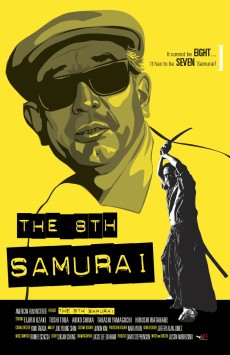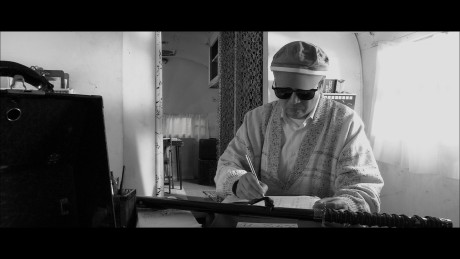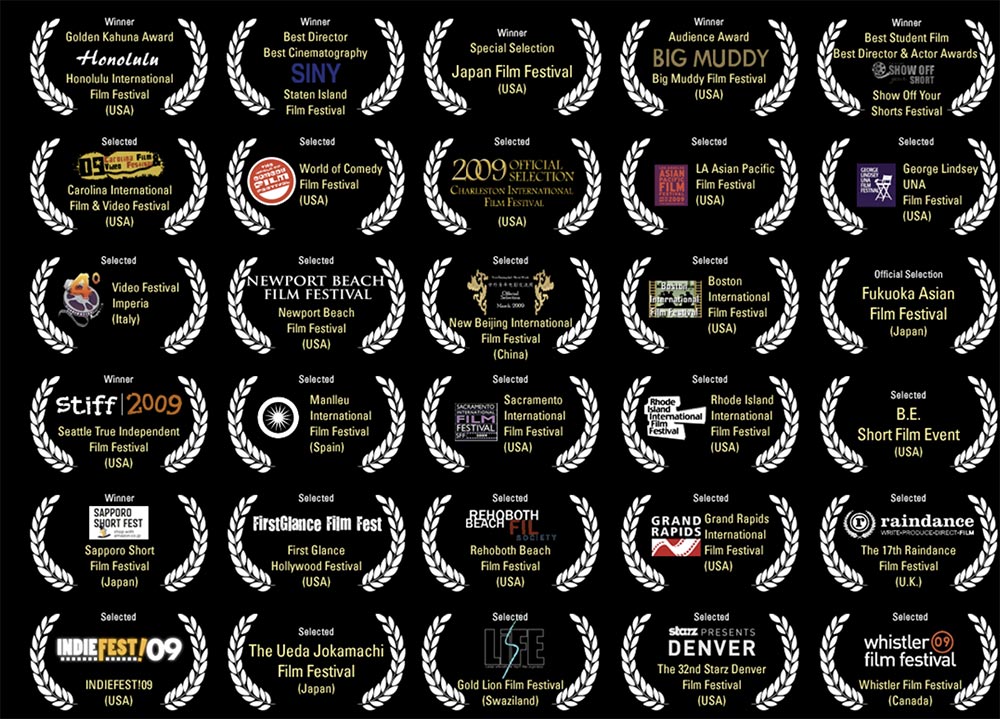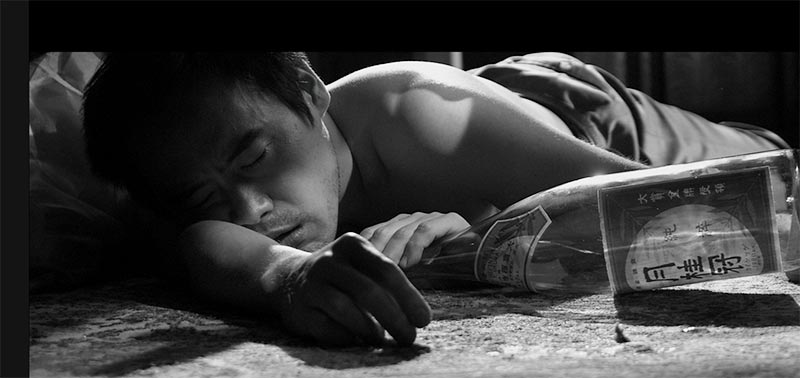2009 Drama/Short Film, The 8th Samurai
This was the official website of the 2009 Drama/Short Film, The 8th Samurai. It was once possible to download the short from this site.
However if you want to down load the short you must go to:https://vimeo.com/46057011
Content and images are from outside sources.
Storyline
It is the early 1950s and Japanese Cinema is reaching international acclaim. Nanshu, a poor man with a big heart, is struggling to break into the booming film business, but the only thing keeping him from success is his desire to be the best. After numerous failed attempts, he gets the chance of a lifetime. During an encounter with Japan most ambitious film director, he lands a lead role as one of the eight samurai that will save a village from group of bandits in a new epic film about to go into production. For Nanshu, this is more than just a lead role, it is his ticket out of poverty. But the night before the first day of shooting, the director has a troublesome dream. A dream that will dictated the fate of the film and the fate of Nanshu. And after months of training, there is only one thing Nanshu didn't prepare for: being fired.
The 8th Samurai Trailer
"It cannot be Eight,
It has to be Seven Samurai!"
The 8th Samurai is a tragic comedy about fate inspired by the Samurai films, Italian Neorealism and the American comedies of the 1950s.
Written and Directed by Justin Ambrosino.
Starring Eijiro Ozaki, Akiko Shima, Toshi Toda, Hiroshi Watanabe, Takashi Yamaguchi, Ikumo Ando & Yuki Matsuzaki.
Produced by Soojin Chung, Ken Ochiai, Justin Ambrosino & David Stephenson
Cinematography by Lucas Lee Graham
Edited by Soojin Chung
Music by Romeo Scaccia
FROM: AkiraKurosawainfo.com
Akira Kurosawa news, information & discussion
Review: The 8th Samurai
 Remember The 8th Samurai, a short film about an actor who is fired from the set of a samurai film directed by a man who bears an uncanny resemblance to Kurosawa?
Remember The 8th Samurai, a short film about an actor who is fired from the set of a samurai film directed by a man who bears an uncanny resemblance to Kurosawa?
Director-writer Justin Ambrosino was kind enough to send me a copy of his work, and I have now watched it a couple of times and finally found the time to put down a few words. What follows are some observations that I thought people frequenting this site might find interesting. Yet, let me say that this is not really a structured review, mainly because I don’t quite know how to review a short film which, at the end of the day, is perhaps intended more as a display of skills than as a fully realised artistic statement.
Since the main question that you want an answer to is probably “is it worth watching?”, I’ll tackle that one first. While the film won’t blow your mind and doesn’t really offer any new perspective on Kurosawa or his works, I nevertheless quite enjoyed it, and would recommend it. I wouldn’t go out of my way to get to see it, but if it’s playing in a theatre, TV channel or DVD player near you, it’s certainly worth the half an hour, plus the additional time discussing it on this website. Hopefully, the DVD, or better yet a paid download of the film, will be made available on the official website sometime soon.
The cast is for the most part really good, and there are what seem to be a couple of fun references to characters from Kurosawa’s films thrown in there. However, and perhaps quite predictably, one notable performance bothered me — I had trouble believing the “Kurosawa” character. Although the director is never identified by name in the movie, I automatically took Kurosawa as my reference point. And why wouldn’t you:

Unfortunately, the character in the film seems the wrong height and has wrong mannerisms, at least based on what I have seen of Kurosawa. He also appeared quite whimsical, playing with the “mad genius” character type that Kurosawa has for some reason time to time been identified with (and which I think was quite far from his actual character). On the other hand, perhaps having someone actually imitate Kurosawa wouldn’t really have been any less strange, either.
Another aspect that I found curious in relation to the director was the time frame of the film. Presumably set during the Seven Samurai shoot in 1950s, a notion that is enhanced by some of the equipment shown, the “Kurosawa” in the film had the director’s distinct 1980s look, although the actor playing him was considerably younger. This is certainly something that most viewers wouldn’t think about, but if you have spent as much time with Kurosawa as we have, things like these may confuse you and consequently make the viewing experience, if not worse, at least somewhat stranger.
Having said all that, the Kurosawa character is actually not very central to the film. What is more interesting is the main character (the titular eighth samurai) and his relationship with his dead mother, who is excellently portrayed by actress Akiko Shima — probably my favourite performance of the short film. Although the relationship doesn’t quite resolve itself, it works well in the story.
Apart from the interaction between these two characters, the overall story does not come across all that important, and as a result the film does end up a little like a series of interesting scenes more than a unified film driven by its story. This is not necessarily a bad thing, however, as some of the scenes are really well constructed. And as I mentioned earlier, one does get the feeling that you are watching a display of skills intended for those making and financing films, rather than a story made for us, the casual audience.
I am not one who can properly evaluate the technicalities of film making, but I do know when I like something that I see and when I don’t (and I guess that’s the ultimate goal of any film maker (to please us, the audience, that is)). For the most part, what I saw in The 8th Samurai I liked. There were a few more awkward cuts and shots, and if I had to pick one aspect of the film that most bothered me technically, it would be the lighting that I felt was too stage-like even for a black and white film. The subtitle translation (the film speaks Japanese) also seemed off the mark a few times, which felt strange considering that it is an American production.
Having so far mainly talked about what I saw, it would be a crime to finish this piece without talking about what I heard. The score, and especially so the theme piece, all by Romeo Scaccia, is perhaps the most memorable part of the film. Just like with the theme of Seven Samurai, which the theme of The 8th Samurai in many ways resembles while still retaining its own identity, you will find yourself humming this one long after the film has ended.
In conclusion, The 8th Samurai is an interesting little film that is worth viewing if given the chance, if only to ponder over the depiction of the Kurosawa character, and how it fits in with the historical Kurosawa and the mythical Kurosawa, both of which I feel are represented in film studies. With strong acting, a beautiful score and a number of interesting scenes to its merit, I would say that Justin Ambrosino has shown promise with his short film. I will certainly be keeping an eye on whatever it is that he will be working on next.
"This film had a very special quality, an almost alert dream state, or a meditative core that belies all the fraught energy spent on the drama. It's a behind the scenes ambiance like you're contemplating Nothing, or as Rev Sale suggests, "nothingness" in his post on http://www.theastronomycafe.net/tools/nothing.html titled In Search Of Nothing. Nothing and the existential nature of the idea of nothing is the foundation of the setting into which the narrative plays. It's brilliant." Eddy Johnson
PRESS
Justin Ambrosino's "The 8th Samurai" eligible for Oscar Nomination
Justin Ambrosino, who was recently interviewed on i- italy, is happy to announce that his film THE 8TH SAMURAI has won the top prize THE BEST OF FEST AWARD at the LA SHORTS FEST which means it now qualifies for the Academy Awards! The film has already won seven awards at festivals in the US and abroad.
The film, about a struggling actor in 1950's Japan, was shot in black and white and is in Japanese, has a universal message of hope and survival. Justin, an Italian-American from Staten Island, went out to LA to attend AFI a few years ago. "The 8th Samurai" was made as Justin's thesis at the American Film Institute.
Justin recently said "I''m proud of THE 8TH SAMURAI and how far it is going. I think it is a film that deserves an audience because it was made for them. We all tried so hard to make the audience feel something. Though the film isn't timely, it's timeless, though its not political, its emotional and though it's Japanese, it is still universal. This award gives the film a chance to be seen by more and more people and that is such a luxury when it comes to a short film. Me and my whole cast and crew are so extremely grateful."
"The process to being nominated is very competitive. First, you have to be shortlisted which means they choose ten films out of the best 100, more or less, best short films from around the world. Then that gets cut down to five. It involves a lot of factors, but after winning this award and qualifying, well anything is possible. At least the film will be watched by the Academy which makes me happy.
This award causes awareness about the film and it gives the film a chance to be seen by more and more people. That is such a luxury when it comes to a short film. I think it is a film that deserves an audience because it was made for them. We all tried so hard to make the audience feel something.
Fellow filmmakers, festival jurors, my teachers, AFI alumni and the audience have always believed the film could be a possible contender for the Academy but I never imagined it would go this far. I'm proud of THE 8TH SAMURAI.
I have a lot I want to do in my life, a lot of dreams to fulfill, goals to accomplish, stories to tell and right now, at this time in my life, it is probably the most important thing that could happen to me. Now I can continuing pushing forward with great excitement, confidence and most importantly hope."
More Background On The 8th Samurai
"The 8th Samurai" is a 2009 short film directed and written by Justin Ambrosino, which uniquely intertwines elements of Japanese cinematic history with a storyline that resonates with themes of fate and ambition. The film centers around the character Nanshu, played by Eijiro Ozaki, who aims to break into the Japanese film industry during its 1950s boom. His journey takes a pivotal turn when he is unexpectedly fired from a major samurai film, despite the rigorous training and personal sacrifices he made to secure his role.
The narrative of "The 8th Samurai" draws inspiration from the classic works of Akira Kurosawa, specifically echoing the epic ensemble setup of Kurosawa's "Seven Samurai". The film pays homage to Kurosawa's style, incorporating elements like strategic framing, composition, and a distinctive use of music, albeit with a twist that aligns more with tragicomedy.
The production of "The 8th Samurai" showcased a remarkable attention to detail, especially in its faithful recreation of the period's cinematic equipment and costumes. Ambrosino and his team went to great lengths to source authentic props, such as cameras and lighting equipment from the era, to lend credibility to the film's setting.
"The 8th Samurai" has enjoyed success across various film festivals, attributed in part to its reflective and humorous take on the film industry and its intrinsic challenges. The film not only explores the personal aspirations and setbacks of its characters but also comments on the broader cinematic culture of Japan during a historically significant era.
This film serves as a reflection of Ambrosino's broader filmmaking philosophy, which often involves deep respect and meticulous research into the subjects he portrays. His approach to "The 8th Samurai" was no exception, involving extensive collaboration with the cast to develop characters that felt authentic and resonant within the storied traditions of Japanese cinema.
Popularity
"The 8th Samurai" has garnered significant attention and accolades within the independent film circuit. It has received multiple awards, including the prestigious 'Best of Fest' award at the LA Shorts Fest, which qualified it for consideration for the Academy Awards. This recognition is just one among many, as the film has been celebrated at over 20 international film festivals, including winning the Golden Kahuna Award at the Honolulu International Film Festival and accolades for Best Director and Best Cinematography at the Staten Island Film Festival.
The film's unique blend of tragic comedy, inspired by classic Samurai films, Italian Neorealism, and 1950s American comedies, has resonated with audiences and critics alike. It is particularly noted for its creative homage to the legacy of Akira Kurosawa, although it presents these influences through a lens of humor and parody which some viewers found to be a refreshing take on the traditional samurai genre.
In terms of popularity, "The 8th Samurai" has not only succeeded in the festival scene but has also engaged broader audiences through its touring, including the Akira Kurosawa 100th Anniversary Tour. This has helped to maintain a consistent interest in the film across various cultural and cinematic communities.
Overall, the film has effectively carved out a niche for itself by blending homage with originality, earning a spot in the landscape of both short and culturally rich cinema. Its ongoing recognition in film festivals highlights its success and the resonance of its thematic and stylistic choices with a diverse audience.
Press & Media Coverage
"The 8th Samurai" has attracted considerable media attention and press coverage, particularly due to its unique thematic approach and the accolades it has received in various film festivals.
-
Academy Awards Consideration: The film's win at the LA Shorts Fest, earning the 'Best of Fest' award, positioned it for consideration for the Academy Awards. This milestone was highlighted in multiple press releases and articles, emphasizing the film's quality and the significance of such recognition for a short film.
-
Festival Circuit Success: The film has been extensively covered for its success on the film festival circuit, having been selected and awarded at numerous festivals globally. Notably, it received awards for Best Director and Best Cinematography at the Staten Island Film Festival, among others. These achievements have been featured in festival newsletters, entertainment websites, and press releases, contributing to the film's visibility and prestige within the independent film community.
-
Cultural and Artistic Discussions: Given its thematic and stylistic nods to Akira Kurosawa and classic cinematic styles, the film has been a topic of discussion in various cultural and cinematic forums and blogs. Articles often discuss its creative homage to Kurosawa's work, its unique blend of humor with traditional samurai storytelling, and its reflection on themes of fate and personal ambition. This kind of coverage not only highlights the film's artistic merits but also engages a broader audience interested in film history and cultural studies.
-
Interviews and Filmmaker Insights: Director Justin Ambrosino has been featured in several interviews, where he discusses the inspiration behind the film, the challenges of production, and his personal connection to the themes explored. These interviews provide deeper insights into the creative process behind "The 8th Samurai" and have been instrumental in shaping public and critical perception of the film.
The press and media coverage of "The 8th Samurai" reflect its role as a significant piece in contemporary short filmmaking, bridging cultural storytelling with modern cinematic techniques. The film's journey through festivals and the accolades it has garnered underscore its impact and the continued interest from both critics and audiences alike.
Audience
"The 8th Samurai" has resonated well with its audience, garnering positive feedback for its unique narrative approach and homage to classic film styles. Viewers have appreciated the film's tragicomic angle, blending elements of Italian Neorealism and 1950s American comedies with the traditional samurai genre inspired by Akira Kurosawa. This blend has been highlighted as a clever and enjoyable reinterpretation of cinematic classics, making it accessible and entertaining to a diverse audience.
The audience's reception is particularly positive regarding the film's ability to engage with its themes of fate and ambition through well-crafted storytelling and strong performances. The portrayal of the main character's journey and his interactions, especially the dynamics with his mother, have been received as compelling elements that add depth to the narrative.
Critically, the film has been praised for its direction and cinematography, which have been noted in various reviews as enhancing the thematic and aesthetic appeal of the film. The successful fusion of different cinematic styles and the thoughtful depiction of the characters' emotional landscapes have been cited as reasons for its positive reception at film festivals and among general viewers.
Overall, "The 8th Samurai" stands out in the film community not only for its artistic achievements but also for its ability to connect with audiences through a meaningful and creatively told story. This connection is evidenced by its success on the festival circuit and the discussions it has inspired among cinephiles and casual viewers alike.
Known For
"The 8th Samurai" is known for several distinct aspects that set it apart in the realm of short films:
-
Homage to Akira Kurosawa: The film is notably an homage to the works of legendary director Akira Kurosawa, particularly mirroring the style and thematic elements seen in "Seven Samurai". This connection has been a focal point in reviews and discussions about the film, as it cleverly plays with the conventions and expectations of the samurai genre.
-
Tragicomic Elements: The film blends tragedy with comedy, creating a tragicomic narrative that explores themes of fate and personal ambition in the context of 1950s Japanese cinema. This blend is achieved through its storyline and the character's experiences, which also subtly comment on the nature of film and performance.
-
Cinematic Style: "The 8th Samurai" incorporates elements of Italian Neorealism and 1950s American comedy, showcasing a unique cinematic style that resonates with a diverse audience. The film's approach to cinematography and its black and white visual style are frequently praised for enhancing its nostalgic and atmospheric quality.
-
Critical Acclaim and Festival Success: The film has been recognized in various film festivals around the world, receiving numerous awards and nominations. It won the 'Best of Fest' award at the LA Shorts Fest, which qualified it for Academy Award consideration, and it has been a part of the Akira Kurosawa 100th Anniversary Tour, among other accolades.
-
Cultural and Artistic Discussions: "The 8th Samurai" has sparked discussions on its artistic merits, the portrayal of its characters, and its place within both Japanese and global film history. These discussions often focus on its respectful yet innovative take on traditional Japanese themes and its exploration of universal issues through the medium of film.
These elements contribute to the film's reputation as a thoughtful and entertaining piece that both honors and innovates classic film traditions.
Awards
"The 8th Samurai" has achieved notable success in the film festival circuit, garnering several awards that highlight its quality and the appreciation it has received from audiences and critics alike:

-
Best of Fest Award at the LA Shorts Fest: This prestigious award not only celebrated the film's excellence but also qualified it for consideration for the Academy Awards.
-
Golden Kahuna Award at the Honolulu International Film Festival: This award is given to films that excel in creativity and storytelling.
-
Best Director and Best Cinematography at the Staten Island Film Festival: These awards recognized the film's outstanding direction by Justin Ambrosino and the exceptional cinematography by Lucas Lee Graham.
-
Audience Award at the Big Muddy Film Festival: This award reflects the film's ability to connect with viewers, resonating well with the festival's audience.
-
Best Student Film, Best Director, and Best Actor Awards at the Show Off Your Shorts Festival: These accolades highlight the film's comprehensive excellence from its direction and acting to its overall production as a student film.
The film's success at these and other festivals underscores its impact and recognition within the independent film community.
Cultural & Social Significance
"The 8th Samurai" holds significant cultural and social relevance through its multifaceted exploration of themes, its cinematic style, and its narrative approach. Here are several ways in which the film carries cultural and social significance:
-
Homage to Classic Cinema: The film is a tribute to Akira Kurosawa's work, particularly "Seven Samurai," one of the most influential films in global cinema history. By referencing Kurosawa, "The 8th Samurai" not only honors Japanese cinema but also contributes to the ongoing appreciation and study of Kurosawa’s impact on filmmaking techniques, storytelling, and the portrayal of samurai culture.
-
Exploration of Post-War Japanese Identity: Set in the 1950s, a pivotal era for Japan, the film taps into themes of identity, ambition, and societal expectations during a time of significant change and western influence in Japan. The story of a character trying to find his place in the booming film industry of post-war Japan mirrors the broader cultural shifts and the challenges faced by individuals in adapting to new societal roles.
-
Reflection on the Nature of Art and Performance: Through its narrative and the struggles of its main character—a man ousted from a samurai film—the movie reflects on the nature of performance and the film industry itself. This includes a commentary on the often harsh realities of the entertainment industry, where personal dreams and artistic visions frequently confront commercial pressures and external expectations.
-
Tragicomedy and Human Experience: By blending tragedy and comedy, the film delves into the complexities of human emotions and the absurdities of life’s challenges. This tragicomic approach allows the film to discuss serious themes in a manner that is accessible and engaging, making profound cultural and emotional statements while still providing entertainment.
-
Cultural Exchange and Influence: The film’s style, influenced by Italian Neorealism and 1950s American cinema, showcases the cross-cultural exchanges that enrich film as a medium. It highlights how different cinematic traditions can influence each other, leading to new forms of storytelling that resonate across cultural boundaries.
"The 8th Samurai" is a poignant example of how film can be a medium for exploring and expressing complex cultural and social themes while honoring the traditions of cinema from around the world.
